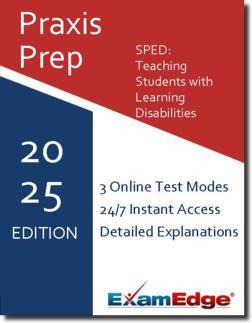Praxis Special Education: Teaching Students with Learning Disabilities (5383) Practice Tests & Test Prep by Exam Edge - Topics
Based on 34 Reviews
- Real Exam Simulation: Timed questions and matching content build comfort for your Praxis SPED: Teaching Students with Learning Disabilities test day.
- Instant, 24/7 Access: Web-based Praxis Special Education Teaching Students with Learning Disabilities practice exams with no software needed.
- Clear Explanations: Step-by-step answers and explanations for your Praxis exam to strengthen understanding.
- Boosted Confidence: Reduces anxiety and improves test-taking skills to ace your Praxis Special Education Teaching Students with Learning Disabilities (5383).

Understanding the exact breakdown of the Praxis Special Education Teaching Students with Learning Disabilities test will help you know what to expect and how to most effectively prepare. The Praxis Special Education Teaching Students with Learning Disabilities has 120 multiple-choice questions The exam will be broken down into the sections below:
| Praxis Special Education Teaching Students with Learning Disabilities Exam Blueprint | ||
|---|---|---|
| Domain Name | % | Number of Questions |
| Development and Characteristics of Students with Learning Disabilities |
17% | 20 |
| Planning and Managing the Learning Environment | 26% | 31 |
| Instruction | 28% | 34 |
| Identification, Eligibility, and Placement | 12% | 14 |
| Foundations and Professional Responsibilities | 17% | 20 |


